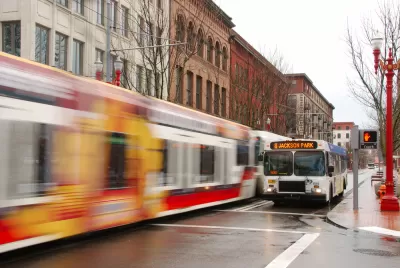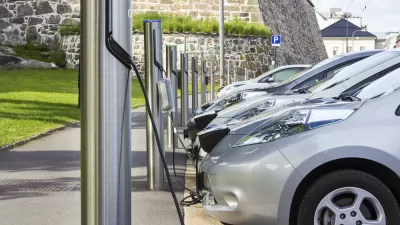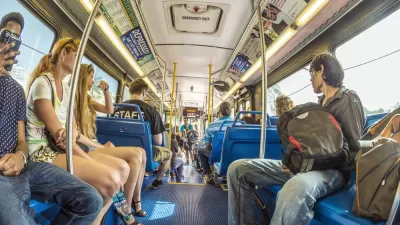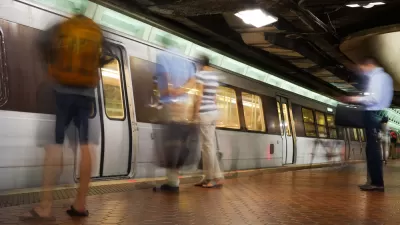The federal government can encourage public transit use and electrification through reforms in transportation systems and land use policies.

As climate change intensifies, writes Kevin DeGood, "[t]he United States must adopt policies and make investments to achieve net-zero GHG emissions by midcentury." Two important steps: "electrifying vehicles and reducing the automobile dependence of communities," which includes "[r]apid electrification of transportation powered by renewable energy."
"In addition to electrification, the federal government needs to substantially reform its transportation policies to reduce auto dependence by directing funds to projects that expand transportation choice—including transit, biking, and walking—and encourage infill development," says DeGood. "Climate change cannot be addressed without reforming land use, and land use cannot be changed without reforming transportation."
The design of transportation systems "has important implications for not only driving and mobile emissions but also the economic productivity of those facilities and the long-term cost burden associated with maintenance." DeGood compares Ohio and Washington, D.C.'s systems: "every lane mile of roadway in Washington, D.C., supports, on average, 4 1/2 times as many residents as in Ohio. … Stated differently, every dollar spent on building and maintaining the roadway network in Washington is providing a larger economic return on investment than the equivalent dollar spent in Ohio." Yet "83 percent of Ohio adults drive to work alone, while only 4 percent take transit, bike, or walk. In Washington, only 34 percent of residents drive alone, while 53 percent take transit, bike, or walk."
"Congress is currently debating the reauthorization of federal highway, transit, and passenger rail programs. The U.S. House of Representatives has passed the INVEST Act, which contains several key policy reforms to address climate change and improve overall system performance." The act, writes DeGood, could be "a strong step in a new direction, pushing states and regions to make different, more sustainable, and more productive investments with federal dollars."
FULL STORY: To Tackle Climate Change, We Must Reform Land Use

Alabama: Trump Terminates Settlements for Black Communities Harmed By Raw Sewage
Trump deemed the landmark civil rights agreement “illegal DEI and environmental justice policy.”

Planetizen Federal Action Tracker
A weekly monitor of how Trump’s orders and actions are impacting planners and planning in America.

The 120 Year Old Tiny Home Villages That Sheltered San Francisco’s Earthquake Refugees
More than a century ago, San Francisco mobilized to house thousands of residents displaced by the 1906 earthquake. Could their strategy offer a model for the present?

Ken Jennings Launches Transit Web Series
The Jeopardy champ wants you to ride public transit.

BLM To Rescind Public Lands Rule
The change will downgrade conservation, once again putting federal land at risk for mining and other extractive uses.

Indy Neighborhood Group Builds Temporary Multi-Use Path
Community members, aided in part by funding from the city, repurposed a vehicle lane to create a protected bike and pedestrian path for the summer season.
Urban Design for Planners 1: Software Tools
This six-course series explores essential urban design concepts using open source software and equips planners with the tools they need to participate fully in the urban design process.
Planning for Universal Design
Learn the tools for implementing Universal Design in planning regulations.
Clanton & Associates, Inc.
Jessamine County Fiscal Court
Institute for Housing and Urban Development Studies (IHS)
City of Grandview
Harvard GSD Executive Education
Toledo-Lucas County Plan Commissions
Salt Lake City
NYU Wagner Graduate School of Public Service





























